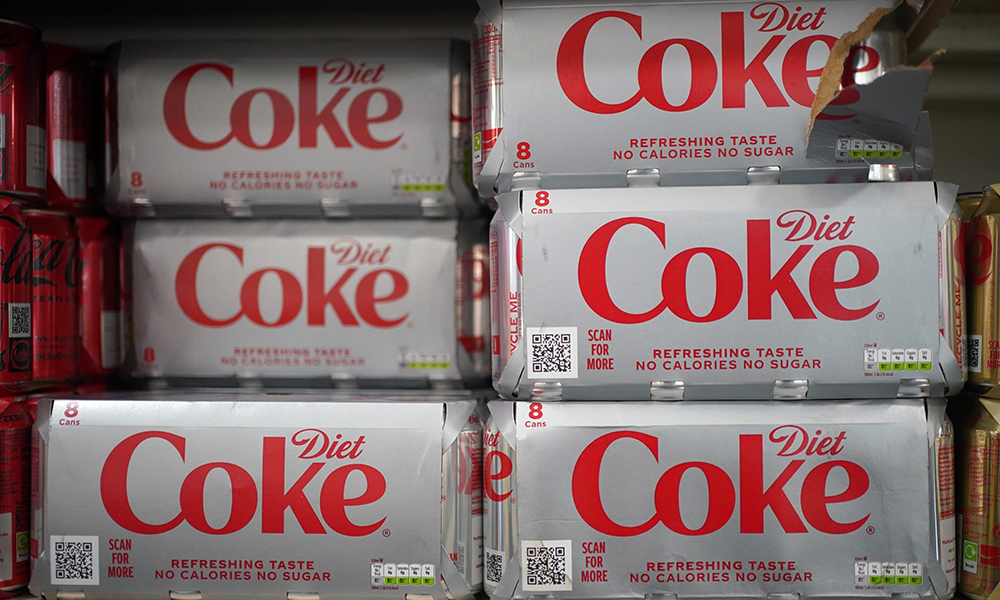
健怡可樂(lè)(Diet Coke)的愛(ài)好者們迎來(lái)了福音,因?yàn)槭澜缧l(wèi)生組織(World Health Organization)發(fā)布的第二份報(bào)告證實(shí),,在這種飲料中發(fā)現(xiàn)的一種成分“在實(shí)際暴露水平下”是安全的,。
今年6月,一份外泄的報(bào)告曝光,,國(guó)際癌癥研究機(jī)構(gòu)(International Agency for Research on Cancer)計(jì)劃將阿斯巴甜列為致癌物質(zhì),。阿斯巴甜是健怡可樂(lè)里常用的人造甜味劑。
但這份評(píng)估報(bào)告是世界衛(wèi)生組織的下屬部門(mén)計(jì)劃在7月13日發(fā)布的兩份報(bào)告之一,。
第二份報(bào)告來(lái)自由世界衛(wèi)生組織和聯(lián)合國(guó)糧食及農(nóng)業(yè)組織(UN Food and Agriculture Organization)的專家組成的機(jī)構(gòu)——食品添加劑聯(lián)合專家委員會(huì)(Joint Expert Committee on Food Additives),。這份報(bào)告確定了對(duì)人體不構(gòu)成健康風(fēng)險(xiǎn)的阿斯巴甜安全攝入量。
這份報(bào)告與第一份報(bào)告在同一天發(fā)表,,其中的結(jié)果受到了健康和飲料屆利益相關(guān)者的歡迎,。許多人批評(píng)國(guó)際癌癥研究機(jī)構(gòu)的報(bào)告未能提供有關(guān)阿斯巴甜安全攝入量的背景信息。
國(guó)際癌癥研究機(jī)構(gòu)的研究人員包括美國(guó)毒理學(xué)專家蘇珊·埃爾莫爾博士,。她解釋稱:“食品添加劑聯(lián)合專家委員會(huì)是全球食品成分安全性方面的權(quán)威機(jī)構(gòu),。與國(guó)際癌癥研究機(jī)構(gòu)不同,食品添加劑聯(lián)合專家委員會(huì)會(huì)考慮其安全性評(píng)估的風(fēng)險(xiǎn)和危害,,這意味著它的結(jié)論針對(duì)任何成分對(duì)人類健康的實(shí)際影響提供了最全面的評(píng)估,。”
埃爾莫爾說(shuō):“由于國(guó)際癌癥研究機(jī)構(gòu)僅分析了食品成分的潛在危害,,但并未評(píng)估其風(fēng)險(xiǎn),因此并不能完整描述一種成分的安全性,例如阿斯巴甜,,結(jié)果會(huì)給社會(huì)大眾造成不必要的混亂,。”
食品添加劑聯(lián)合專家委員會(huì)的研究發(fā)現(xiàn),,體重154磅(約69.85千克)的普通人每天攝入超過(guò)9罐至14罐無(wú)糖飲料,,才會(huì)出現(xiàn)健康問(wèn)題。該委員會(huì)由來(lái)自15個(gè)國(guó)家的13位委員和13位專家組成,。
大量證據(jù)
非酒精類飲料行業(yè)協(xié)會(huì)國(guó)際飲料協(xié)會(huì)理事會(huì)(International Council of Beverages Associations)對(duì)此表示歡迎,,認(rèn)為食品添加劑聯(lián)合專家委員會(huì)所澄清的事實(shí)有助于提高消費(fèi)者的信心。
國(guó)際飲料協(xié)會(huì)理事會(huì)的主任凱特·洛特曼對(duì)《財(cái)富》雜志表示:“世界衛(wèi)生組織和聯(lián)合國(guó)糧食及農(nóng)業(yè)組織的研究結(jié)果經(jīng)過(guò)嚴(yán)格審查后,,進(jìn)一步增強(qiáng)了消費(fèi)者對(duì)阿斯巴甜安全性的信心,,在消費(fèi)者考慮減少糖分和熱量攝入時(shí),這份報(bào)告將具有重要的指導(dǎo)意義,。”
“食品添加劑聯(lián)合專家委員會(huì)認(rèn)為阿斯巴甜是安全的這一綜合結(jié)論,,是基于四十多年來(lái)大量的科學(xué)證據(jù),,以及90多個(gè)國(guó)家食品安全部門(mén)的積極決定?!?/p>
這則消息令飲料廠商長(zhǎng)舒一口氣,,因?yàn)榇饲坝蓄愃频难芯拷Y(jié)果曾經(jīng)對(duì)使用各種食品添加劑的公司造成嚴(yán)重影響。2015年,,國(guó)際癌癥研究機(jī)構(gòu)委員會(huì)審查發(fā)現(xiàn),,草甘膦“可能致癌”。
2021年,,德國(guó)制藥和農(nóng)藥公司拜耳(Bayer)在對(duì)美國(guó)法院判決提起的第三次上訴中敗訴,。該公司被法院判決賠償客戶8,600萬(wàn)美元,因?yàn)榭蛻魧⒒及w咎于使用了拜耳生產(chǎn)的含草甘膦的除草劑,。
卡路里控制委員會(huì)(Calorie Control Council)的主席羅伯特·蘭金稱,“顯而易見(jiàn)”,,食品添加劑聯(lián)合專家委員會(huì)列出的構(gòu)成危險(xiǎn)的阿斯巴甜攝入水平“是不現(xiàn)實(shí)的,,我們不建議以這種水平攝入阿斯巴甜,而且這也不符合這類成分的預(yù)期用途,?!笨防锟刂莆瘑T會(huì)是代表低熱量和無(wú)熱量食品飲料行業(yè)的國(guó)際協(xié)會(huì),。
蘭金告訴《財(cái)富》雜志,,消費(fèi)者“強(qiáng)烈渴望”有可靠的信息。他還指出,,主張阿斯巴甜不安全“會(huì)造成誤導(dǎo),,是不準(zhǔn)確的,將在全球近5.4億糖尿病患者和依靠和/或選擇含低熱量和無(wú)熱量甜味劑的產(chǎn)品控制體重的數(shù)以百萬(wàn)計(jì)的消費(fèi)者當(dāng)中引起恐慌,。”
行業(yè)協(xié)會(huì)美國(guó)飲料協(xié)會(huì)(American Beverage Association)稱,,無(wú)論是美國(guó)食品與藥品管理局(FDA)還是全球的食品主管部門(mén)始終認(rèn)為阿斯巴甜是安全的,,這“讓我們對(duì)食品安全充滿信心”。美國(guó)飲料協(xié)會(huì)的成員包括可口可樂(lè)(Coca-Cola)的經(jīng)銷(xiāo)商Abarta和百事可樂(lè)公司(Pepsi-Cola),。(財(cái)富中文網(wǎng))
譯者:劉進(jìn)龍
審校:汪皓
健怡可樂(lè)(Diet Coke)的愛(ài)好者們迎來(lái)了福音,,因?yàn)槭澜缧l(wèi)生組織(World Health Organization)發(fā)布的第二份報(bào)告證實(shí),在這種飲料中發(fā)現(xiàn)的一種成分“在實(shí)際暴露水平下”是安全的,。
今年6月,,一份外泄的報(bào)告曝光,,國(guó)際癌癥研究機(jī)構(gòu)(International Agency for Research on Cancer)計(jì)劃將阿斯巴甜列為致癌物質(zhì),。阿斯巴甜是健怡可樂(lè)里常用的人造甜味劑。
但這份評(píng)估報(bào)告是世界衛(wèi)生組織的下屬部門(mén)計(jì)劃在7月13日發(fā)布的兩份報(bào)告之一,。
第二份報(bào)告來(lái)自由世界衛(wèi)生組織和聯(lián)合國(guó)糧食及農(nóng)業(yè)組織(UN Food and Agriculture Organization)的專家組成的機(jī)構(gòu)——食品添加劑聯(lián)合專家委員會(huì)(Joint Expert Committee on Food Additives),。這份報(bào)告確定了對(duì)人體不構(gòu)成健康風(fēng)險(xiǎn)的阿斯巴甜安全攝入量。
這份報(bào)告與第一份報(bào)告在同一天發(fā)表,,其中的結(jié)果受到了健康和飲料屆利益相關(guān)者的歡迎,。許多人批評(píng)國(guó)際癌癥研究機(jī)構(gòu)的報(bào)告未能提供有關(guān)阿斯巴甜安全攝入量的背景信息。
國(guó)際癌癥研究機(jī)構(gòu)的研究人員包括美國(guó)毒理學(xué)專家蘇珊·埃爾莫爾博士,。她解釋稱:“食品添加劑聯(lián)合專家委員會(huì)是全球食品成分安全性方面的權(quán)威機(jī)構(gòu),。與國(guó)際癌癥研究機(jī)構(gòu)不同,食品添加劑聯(lián)合專家委員會(huì)會(huì)考慮其安全性評(píng)估的風(fēng)險(xiǎn)和危害,,這意味著它的結(jié)論針對(duì)任何成分對(duì)人類健康的實(shí)際影響提供了最全面的評(píng)估,。”
埃爾莫爾說(shuō):“由于國(guó)際癌癥研究機(jī)構(gòu)僅分析了食品成分的潛在危害,,但并未評(píng)估其風(fēng)險(xiǎn),,因此并不能完整描述一種成分的安全性,,例如阿斯巴甜,,結(jié)果會(huì)給社會(huì)大眾造成不必要的混亂?!?/p>
食品添加劑聯(lián)合專家委員會(huì)的研究發(fā)現(xiàn),,體重154磅(約69.85千克)的普通人每天攝入超過(guò)9罐至14罐無(wú)糖飲料,才會(huì)出現(xiàn)健康問(wèn)題。該委員會(huì)由來(lái)自15個(gè)國(guó)家的13位委員和13位專家組成,。
大量證據(jù)
非酒精類飲料行業(yè)協(xié)會(huì)國(guó)際飲料協(xié)會(huì)理事會(huì)(International Council of Beverages Associations)對(duì)此表示歡迎,,認(rèn)為食品添加劑聯(lián)合專家委員會(huì)所澄清的事實(shí)有助于提高消費(fèi)者的信心。
國(guó)際飲料協(xié)會(huì)理事會(huì)的主任凱特·洛特曼對(duì)《財(cái)富》雜志表示:“世界衛(wèi)生組織和聯(lián)合國(guó)糧食及農(nóng)業(yè)組織的研究結(jié)果經(jīng)過(guò)嚴(yán)格審查后,,進(jìn)一步增強(qiáng)了消費(fèi)者對(duì)阿斯巴甜安全性的信心,,在消費(fèi)者考慮減少糖分和熱量攝入時(shí),這份報(bào)告將具有重要的指導(dǎo)意義,?!?/p>
“食品添加劑聯(lián)合專家委員會(huì)認(rèn)為阿斯巴甜是安全的這一綜合結(jié)論,是基于四十多年來(lái)大量的科學(xué)證據(jù),,以及90多個(gè)國(guó)家食品安全部門(mén)的積極決定,。”
這則消息令飲料廠商長(zhǎng)舒一口氣,,因?yàn)榇饲坝蓄愃频难芯拷Y(jié)果曾經(jīng)對(duì)使用各種食品添加劑的公司造成嚴(yán)重影響,。2015年,國(guó)際癌癥研究機(jī)構(gòu)委員會(huì)審查發(fā)現(xiàn),,草甘膦“可能致癌”,。
2021年,德國(guó)制藥和農(nóng)藥公司拜耳(Bayer)在對(duì)美國(guó)法院判決提起的第三次上訴中敗訴,。該公司被法院判決賠償客戶8,600萬(wàn)美元,因?yàn)榭蛻魧⒒及w咎于使用了拜耳生產(chǎn)的含草甘膦的除草劑,。
卡路里控制委員會(huì)(Calorie Control Council)的主席羅伯特·蘭金稱,,“顯而易見(jiàn)”,食品添加劑聯(lián)合專家委員會(huì)列出的構(gòu)成危險(xiǎn)的阿斯巴甜攝入水平“是不現(xiàn)實(shí)的,,我們不建議以這種水平攝入阿斯巴甜,,而且這也不符合這類成分的預(yù)期用途?!笨防锟刂莆瘑T會(huì)是代表低熱量和無(wú)熱量食品飲料行業(yè)的國(guó)際協(xié)會(huì),。
蘭金告訴《財(cái)富》雜志,消費(fèi)者“強(qiáng)烈渴望”有可靠的信息,。他還指出,,主張阿斯巴甜不安全“會(huì)造成誤導(dǎo),是不準(zhǔn)確的,,將在全球近5.4億糖尿病患者和依靠和/或選擇含低熱量和無(wú)熱量甜味劑的產(chǎn)品控制體重的數(shù)以百萬(wàn)計(jì)的消費(fèi)者當(dāng)中引起恐慌,。”
行業(yè)協(xié)會(huì)美國(guó)飲料協(xié)會(huì)(American Beverage Association)稱,,無(wú)論是美國(guó)食品與藥品管理局(FDA)還是全球的食品主管部門(mén)始終認(rèn)為阿斯巴甜是安全的,,這“讓我們對(duì)食品安全充滿信心”。美國(guó)飲料協(xié)會(huì)的成員包括可口可樂(lè)(Coca-Cola)的經(jīng)銷(xiāo)商Abarta和百事可樂(lè)公司(Pepsi-Cola)。(財(cái)富中文網(wǎng))
譯者:劉進(jìn)龍
審校:汪皓
Diet Coke addicts rejoice—a second report from the World Health Organization has confirmed that an ingredient found in the drink is safe at “real-world exposure levels.”
Last month it was revealed in a leaked report the International Agency for Research on Cancer (IARC) was set to label aspartame, a popular artificial sweetener used in Diet Coke, as a carcinogen.
However, this assessment was the first of two from branches of the WHO due to be released on July 13.
A second report from a body made up of WHO and UN Food and Agriculture Organization (FAO) experts—named the Joint Expert Committee on Food Additives’ (JECFA)—sought to identify how much aspartame humans can safely consume before it becomes a health risk.
The results—published on the same day as the first report—have been applauded by stakeholders in the health and beverage community, many of which had criticized the IARC report for not providing context around how much aspartame can be safely consumed.
Among the observers of the IARC report was Dr Susan Elmore, a U.S.-based toxicology expert, who explained: “JECFA is the world’s leading authority on food ingredient safety and, unlike IARC, takes into account both risk and hazard when it conducts its safety review, meaning its conclusions provide the most comprehensive assessment of any actual impact on human health.
“Since IARC only looks at the hazard potential and not risk, it does not paint a full picture of the safety of an ingredient, like aspartame, and as a result can cause unnecessary public confusion,” Elmore added.
According to JECFA’s findings—which were conducted by 13 members and 13 experts from 15 countries—the average 154lb person would need to consume more than nine to 14 cans of diet beverages every day over the course of their life to raise safety concerns.
“Overwhelming body of evidence”
The International Council of Beverages Associations—a trade organization for the nonalcoholic beverage industry—welcomed the clarification for the confidence it gives to consumers.
Kate Loatman, the director of the body, told Fortune: “After rigorous review, this landmark WHO and FAO finding further strengthens confidence in the safety of aspartame will play a vital role in informing consumers as they consider all options to reduce sugar and calories in their diets.
“JECFA’s comprehensive conclusion that aspartame is safe builds on the overwhelming weight of scientific evidence for more than four decades, as well as positive determinations by food safety authorities in more than 90 countries.”
The news will come as a relief to beverage producers as similar rulings in the past have resulted in a massive impact on businesses that use the ingredients. In 2015, the IARC committee conducted a review that found glyphosate is “probably carcinogenic.”
By 2021 German drug and pesticide business Bayer had lost its third appeal against U.S. court verdicts that awarded damages of $86 million to customers blaming their cancer on use of its glyphosate-based weed killers.
Robert Rankin, President of the Calorie Control Council—an international association representing the low- and reduced-calorie food and beverage industry—said that “obviously” the level of consumption outlined by JEFCA that would cause aspartame to be dangerous is “not realistic, recommended, nor is it ?aligned with the intended use of these ingredients.”
He told Fortune consumers have a “strong desire” for reliable information, adding that to assert that aspartame is anything other than safe would be “misleading, inaccurate, and fear-mongering to the nearly 540 million people globally living with diabetes and millions of others managing their body weight who rely on and/or chose products that contain low- and no-calorie sweeteners.”
Trade association American Beverage—which counts Coca-Cola distributor Abarta and Pepsi-Cola among their members—said the fact that not only the FDA, but food agencies worldwide, have continually found aspartame safe “makes us confident in the safety of our products.”






